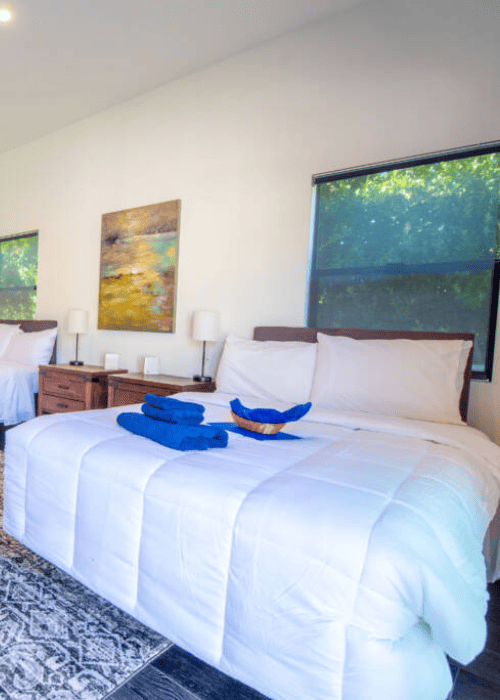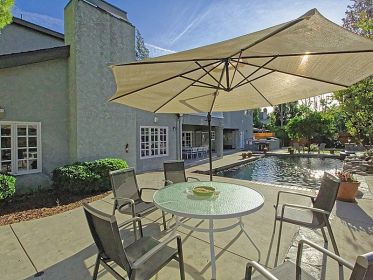Inpatient Drug & Alcohol Rehab in Los Angeles, CA
What are Inpatient Treatment Programs in Los Angeles, CA?
An inpatient or residential rehab program for substance abuse is a type of treatment where a person lives at a facility full time while receiving care for addiction. These programs provide a structured and supportive environment away from everyday triggers or stressors.
Residential or inpatient substance abuse treatment programs are an intensive treatment option for those needing support for drug and alcohol addictions and/or a mental health disorder (dual diagnosis). While participating in an inpatient program, clients receive 24-hour support as it requires them to live at a treatment facility for around-the-clock medical supervision.
Our Los Angeles inpatient rehab center provides structure and routine while also giving clients access to more tools, resources, and therapies than what is provided in individual, group, or family therapy alone. While it’s common for clients to stay at an inpatient rehab center for about a month, some stay for up to six months.
There is growing recognition that safe and stable living environments are essential in recovery for individuals with substance use disorders (SUDs) that need structured care. The purpose is to help people with SUDs, and a high level of psychosocial needs, to become stable in their recovery with solution-focused addiction therapy and various treatment options.
How Does Inpatient Rehab Work?
Inpatient rehab works by providing a structured, supportive environment where individuals can focus entirely on recovery from substance use. The process begins with an admission and assessment phase, during which medical and counseling staff evaluate a person’s physical health, mental health, and substance use history to create a personalized treatment plan. If detox is needed, medical professionals help manage withdrawal symptoms safely and comfortably. Once detox is complete, patients follow a structured daily schedule that includes therapy, group sessions, educational activities, and time for rest or recreation.
Therapy is a central part of inpatient rehab, combining one-on-one counseling with group sessions to help individuals understand the root causes of addiction, build coping skills, and connect with peers who share similar experiences. Family involvement is often encouraged through therapy or education programs that strengthen communication and support systems. In addition to therapy, patients participate in workshops and activities that teach relapse prevention, stress management, and life skills to prepare for lasting recovery.
As treatment progresses, the care team works with each person to develop an aftercare plan that supports continued success after leaving the facility. This may include outpatient therapy, support groups, or sober living arrangements. Overall, inpatient rehab provides 24-hour care, structure, and therapeutic support designed to help individuals build a foundation for long-term sobriety and improved well-being.
Who is Inpatient Rehab Best For?
Inpatient rehab is best for people who need a high level of structure, support, and medical supervision to recover from substance use. It is especially recommended for individuals with severe addictions, those who have tried outpatient treatment without success, or people who face strong triggers and unstable environments at home. Living full-time in a treatment facility allows them to step away from the influences or stressors that may contribute to substance use and focus completely on recovery.
This type of program is also ideal for people who require medical detox or have co-occurring mental health disorders, such as depression, anxiety, or trauma-related conditions, that need integrated care. Inpatient settings provide access to round-the-clock medical and therapeutic staff who can monitor progress and adjust treatment as needed.
Younger individuals, people with a long history of relapse, or those without a strong support system may also benefit from inpatient rehab. The combination of structure, therapy, and community helps build stability, accountability, and coping skills that support long-term sobriety once treatment ends.
Benefits of Inpatient or Residential Treatment for Addiction
Benefits of inpatient rehab for addiction treatment include:
- 24/7 medical and emotional support – Continuous care from doctors, nurses, and therapists ensures safety during detox and provides immediate help when cravings or emotional challenges arise.
- Structured daily routine – A consistent schedule of therapy, activities, and rest helps rebuild healthy habits, reduce chaos, and create accountability.
- Safe, substance-free environment – Living at the facility removes access to drugs and alcohol, reducing exposure to triggers and negative influences.
- Comprehensive therapy options – Programs typically include individual counseling, group therapy, and family sessions to address emotional, behavioral, and relationship issues.
- Treatment for co-occurring mental health disorders – Many facilities provide integrated care for conditions like anxiety, depression, or trauma, which often contribute to substance use.
- Peer support and community – Sharing the recovery journey with others fosters motivation, belonging, and encouragement.
- Focus on relapse prevention – Patients learn coping strategies and life skills to manage triggers and maintain sobriety after leaving treatment.
- Personalized care plans – Each program is tailored to meet individual needs, ensuring treatment aligns with personal goals and challenges.
- Aftercare planning – Staff help develop a plan for continued support through outpatient therapy, support groups, or sober living environments.
How Much Does Residential Rehab Cost?
The cost of residential rehab can vary widely depending on the facility, location, length of stay, and level of care provided. On average, a standard inpatient program costs between $12,000 and $30,000 for a 30-day stay, while luxury or specialized programs can exceed $50,000 or more. Programs that include medical detox, dual diagnosis treatment, or extended stays typically fall on the higher end of the range. Insurance coverage, payment plans, and financial assistance options can help make treatment more affordable for those in need.
Factors that may impact cost include:
- Length of stay: The longer a person remains in treatment, the higher the total cost will be because housing, meals, and therapy sessions are provided throughout the stay.
- Level of care: Programs that offer intensive medical supervision, 24-hour nursing, or dual diagnosis treatment for mental health conditions tend to cost more due to the specialized staff and resources required.
- Facility amenities: Luxury or private rehab centers that include private rooms, gourmet meals, fitness centers, or holistic therapies often charge significantly higher rates.
- Location: Facilities in major cities or areas with a high cost of living usually have higher prices than programs in smaller towns or rural regions.
- Included services: The cost increases if medical detox, medication-assisted treatment, or aftercare planning are built into the program.
- Staff credentials and program quality: Centers that employ licensed therapists, addiction specialists, and medical doctors may have higher fees because of the professional expertise involved.
- Insurance coverage: Costs can vary based on whether the rehab accepts insurance and how much of the program your plan covers, which affects out-of-pocket expenses.
- Program length and intensity: More comprehensive or extended programs that offer a wider range of therapies and support services generally come with higher overall costs.
Can Insurance Cover the Cost of Inpatient Rehab?
Yes, insurance can cover the cost of inpatient rehab, but the extent of coverage varies based on your insurance provider, plan type, and the specific rehab facility. Fill in our form to find out more about your coverage at Harmony Place.
How Long Does Inpatient Rehab Last?
The length of inpatient rehab can vary depending on the individual’s needs, the severity of their addiction, and the type of program they enter. Most programs typically last between 30 and 90 days, with some shorter programs around 7 to 14 days for medical stabilization or initial detox. Longer stays, sometimes up to 6 months, may be recommended for individuals with severe substance use, co-occurring mental health conditions, or a history of relapse. The duration is usually determined during an initial assessment and can be adjusted based on progress, treatment goals, and medical or therapeutic needs.
How to Find the Best Inpatient Rehab Program
Finding the best inpatient rehab program requires careful research to ensure the facility meets your specific needs. Start by assessing your level of care, such as whether you need medical detox or treatment for co-occurring mental health conditions, and consider personal preferences like location, amenities, and treatment approaches. Verify that the facility is properly licensed and accredited by reputable organizations, and confirm that the staff includes licensed medical and therapy professionals experienced in addiction treatment. It’s also important to evaluate the types of therapies offered, such as individual counseling, group therapy, or evidence-based approaches, and to ensure the program provides personalized treatment plans. Review the facility’s environment and amenities, and check whether your insurance is accepted or if other payment options are available. Reading reviews and testimonials from former patients can offer insight into the quality of care, but it’s also crucial to trust your instincts and choose a program where you feel supported and confident in the staff’s ability to guide your recovery.
Residential Rehab Sample Schedule
A general example of a residential rehab sample schedule can be found below:
- 7:00 AM – Wake Up & Morning Hygiene: Patients start the day with personal care, making their beds, and preparing for morning activities.
- 7:30 AM – Breakfast: Nutritious meal to fuel the day, often in a communal dining area to encourage social interaction.
- 8:00 AM – Morning Group Therapy: Facilitated sessions focusing on addiction education, coping strategies, and peer support.
- 9:30 AM – Individual Counseling: One-on-one sessions with a therapist to address personal challenges, triggers, and recovery goals.
- 11:00 AM – Recreational or Mindfulness Activity: Yoga, meditation, light exercise, or art therapy to promote emotional and physical well-being.
- 12:00 PM – Lunch: Balanced meal with time to relax and socialize with other patients.
- 1:00 PM – Skills Development Workshop: Sessions on relapse prevention, stress management, life skills, or vocational training.
- 2:30 PM – Group Therapy / Psychoeducation: Focused discussion on behavioral patterns, mental health issues, or family dynamics.
- 4:00 PM – Individual Check-Ins / Medical Appointments: Time for one-on-one meetings with staff, medication management, or health monitoring.
- 5:00 PM – Free Time / Recreation: Patients can engage in supervised leisure activities, journaling, or rest.
- 6:00 PM – Dinner: Meal shared in a community setting to reinforce social skills and routine.
- 7:00 PM – Evening Group Session: Reflection on the day, relapse prevention exercises, or therapeutic support groups.
- 8:30 PM – Personal Time / Relaxation: Quiet time for reading, meditation, or connecting with family via phone/video.
- 10:00 PM – Lights Out: Designated bedtime to encourage rest and maintain structure.
This schedule is a general example; exact times and activities may vary depending on the facility, the intensity of the program, and individual treatment needs.
Residential Inpatient Treatment for Dual Diagnosis in Los Angeles, CA
By focusing on both substance use and mental health (dual diagnosis treatment), the Harmony Place team can create an individualized treatment plan for each client, allowing them to become more stable in their recovery journey. This is important before returning to an unsupervised or outpatient setting, which could harm their recovery.
It needs to be mentioned again that the length of stay at an inpatient rehab center in Los Angeles may vary due to each individual’s needs and treatment goals.
Inpatient Substance Addiction Rehab Near Me
Often, those who suffer from severe substance abuse are left wondering where to turn for help. It can be challenging to know who to call or where to get the best assistance for addiction recovery.
If you or a loved one is seeking compassionate help, our inpatient rehab in Los Angeles provides a trusted path toward lasting recovery. At Harmony Place, we specialize in residential treatment in Los Angeles, offering safe and supportive rehab programs designed to heal the mind, body, and spirit in a peaceful Southern California setting.
Our residential treatment center in Los Angeles delivers individualized care for those struggling with drug and alcohol addiction. We provide a full continuum of services—from medical detox and inpatient treatment programs to outpatient and aftercare—ensuring every client receives the support they need at each stage of recovery. Harmony Place combines evidence-based therapies with holistic approaches to create an effective, whole-person healing experience.


Call Our 24/7 Admission Team

Top-Rated Residential Treatment Centers in Los Angeles, CA
Harmony Place strives to be a top-rated substance abuse treatment center in LA, California. Our highly trained team also provides family therapy in order to help heal the relationships that are damaged due to addiction. Furthermore, our therapies focus on whole body wellness. This means that we treat our client’s physical, psychological, emotional, and spiritual needs.
Drug abuse and alcohol addiction is a chronic illness. It often has relapse rates that are similar to asthma, hypertension, and type 2 diabetes, all chronic diseases requiring monitoring and adjusting. Thus, we consistently assess our clients in order to fully address all of their needs and monitor their progress.
Our team at Harmony Place is here to help you on your recovery journey, whether you need and inpatient drug or inpatient alcohol rehab program. We teach you the skills you need to learn and adjust to living a healthy, sober life.
Available Addiction Therapy and Counseling Programs at Our Inpatient Rehab Center in Los Angeles, CA
While in residential or inpatient substance abuse treatment, clients may participate in the following as a part of their individualized treatment program:
Most inpatient drug rehab centers begin with a medical detox, often referred to as medical detox. Detoxification is the process of clearing the body of substances. Detox is meant to manage the severe and possibly dangerous physical effects of withdrawing from drug use. Withdrawal symptoms can often become intense, which is why detoxification is always done under the supervision of the trained physicians and nurses at Harmony Place.
At times, medication-assisted treatment (MAT) may be needed to assist in the detoxing process from drugs and alcohol. In that case, our physicians choose to do so thoughtfully and as required, with the intention to taper the patient off the medication when it is safe to do so.
Prescribing medication is explicitly done to treat more severe withdrawal symptoms, not replace the client’s original addiction. However, drug detox or alcohol detox does not concentrate on the psychological and behavioral problems associated with addiction. As a result, detox and withdrawal are the first steps in the addiction treatment process, no matter what treatment program a person enters.
Once a client successfully completes detox, he or she can step down to a lower level of care, such as inpatient drug treatment. With that said, there is no rush to complete detox. At our addiction treatment in Los Angeles, we emphasize the importance of being patient and taking things one day at a time.
Request a 100% Confidential Callback
Long-Term Inpatient Rehab in Los Angeles, CA
Long-term inpatient rehab in Los Angeles provides extended, structured care for individuals facing serious substance use challenges. While many inpatient treatment programs begin at 30 days, residential treatment in Los Angeles can also extend to 90 days, six months, or even longer depending on a person’s needs and progress in recovery.
At Harmony Place, our inpatient rehab in California combines evidence-based therapies with holistic care in a supportive residential setting. Because long-term treatment programs allow for deeper healing, clients benefit from integrated services such as co-occurring disorder treatment and relapse prevention planning. As the Substance Abuse and Mental Health Services Administration (SAMHSA) notes, outcomes improve significantly when treatment lasts at least 90 days.
In our long-term residential treatment centers in Los Angeles, clients receive 24-hour clinical support in a safe, non-hospital environment. These inpatient treatment programs help individuals rebuild their physical health, strengthen coping skills, and restore emotional balance—creating a foundation for lasting recovery from drug and alcohol addiction.
-
Therapy sessions that encourage growth and understanding
-
Learning to support each other and form healing relationships
-
Practice adopting positive values that promote a healthy quality of life
-
Learning personal responsibility as they see how their actions affected others
-
A supportive structure that helps residents manage the tasks of daily life such as taking medications and practicing good self-care
-
A cooperative environment where trained therapists, psychiatrists, nurses, residential staff, and others meet regularly to discuss the needs of each resident. This allows for specialized care.
Evidence Based Therapies at Our Inpatient Rehab Center in Los Angeles, California
Residential centers provide a variety of evidence-based therapy approaches as part of the treatment process. This includes family therapy sessions. Family therapy sessions strengthen and support the work done in individual and group therapy. Furthermore, they help promote the healing process and improve the mental health of the client and the family after treatment.
The approach of the treatment center may differ based on the issues being treated and the people providing the services. At Harmony Place, we offer several types of therapies for our clients to create a plan that will work for them.
Individual Therapy
Individual therapy is a confidential process between a client and a therapist. It referred to as therapy, counseling, psychosocial therapy, or talk therapy. Most people have found that it’s best to participate in both group and individual therapy. Taking part in both can improve the chances of making lasting changes.
Many people avoid talking about past traumas and worry that the discussions that take place in treatment won’t stay confidential. It’s important to understand that therapists are trained professionals who support those in recovery and maintain confidentiality. They have experience helping people work through painful and embarrassing issues.
Group Therapy
Group therapy can be an ideal choice for those suffering from addiction. A group therapy session usually involves one or more psychologists who lead a group of about 5 to 15 clients. Group therapy can be done whether you are in an inpatient drug rehab center, outpatient rehab, intensive outpatient program, or another type of treatment program. Talking about yourself in front of strangers sounds intimidating initially, but group therapy provides benefits that individual therapy might not. Such as:
- Groups can serve as a support network and sounding board. Group members can help individuals work through difficult situations and hold them accountable.
- Listening and talking to others can help people put their own problems in perspective.
- Groups allow people to see how others handle problems, which can help individuals discover new strategies for handling personal issues.
Cognitive-behavioral therapy (CBT)
Inpatient Cognitive-behavioral therapy (CBT) examines the differences between what we want to do and what we actually do. For example, addiction is what a person does. But what the individual wanted to do was solve a life issue. CBT is a short-term, goal-oriented treatment that uses a practical path to solving problems. The ultimate goal of this type of therapy is to change the patterns of thinking or behavior that led to drug or alcohol addiction.
CBT is another type of talk therapy that looks at the client’s behavior and thought patterns (cognition). Through this evidence-based therapy, the client can begin to understand how their negative thoughts and attitudes directly affect their behavior. By adding cognition to behavior therapy, cognitive behavioral therapy was born.
How It Works
It works by changing one’s attitudes and behaviors. This is done by highlighting the individual’s thoughts, images, beliefs, and attitudes. In addition, it looks at the relationships a person has that cause the individual to behave in specific ways to deal with emotional problems, allowing the therapists to employ the dual diagnosis care Harmony Place is known for. Thus, it’s a combination of talk and behavioral therapy, bringing together the relationships between our mental health and our actions which led to addictions that eventually guided us to a drug rehab center.
Psychotherapy stresses the importance of the personal meaning we feel for things and how thinking patterns start during childhood. Also, CBT identifies the relationship between our problems, behavior, and thoughts. Once you see the connections, you can learn ways to cope and manage your thoughts and emotions during your addiction treatment and beyond.
Dialectical Behavioral Therapy
Inpatient Dialectical behavioral therapy (DBT) was first developed to treat borderline personality disorder. Since then, research has shown it to be successful in treating depression, bulimia, binge eating, bipolar disorder, SUDs, anxiety symptoms, and PTSD.
Dialectical behavior therapy typically includes individual therapy sessions and DBT skills groups. The individual sessions are one-on-one with a trained therapist. The therapist will help clients stay motivated, apply the DBT skills to daily life, and discuss problems that may arise during their treatment.
Those participating in skills groups learn and practice skills with the other group members. They are all invited to share their experiences and offer mutual support. Clients learn new skills to manage their emotions and decrease conflict in relationships. The skills learned are in four main areas.
DBT Skills:
- Mindfulness: This helps improve one’s ability to accept and be present in the moment.
- Distress tolerance: This works to increase an individual’s tolerance of negative emotions instead of trying to escape them.
- Emotion regulation: It includes strategies to change and manage intense emotions.
- Interpersonal effectiveness: These methods allow people to communicate with others in an assertive manner that maintains self-respect and strengthens relationships.
Family Therapy
The whole family is affected when a family struggles with a substance use disorder. The normal balance of the family shifts as each member adjusts and changes to fit the situation. Typically, family members will respond by becoming overly responsible and controlling, leading to rifts between the client, their family, and possibly between individual members of the family.
Family therapy is psychological counseling that helps members improve communication and solve conflicts. The goal is to clarify the family relationships and encourage closeness and repair if the members choose to. According to the Substance Abuse and Mental Health Services Administration (SAMHSA), family therapy can help families become more aware of their needs. And it helps keep substance abuse or alcohol and drug addiction from moving from one generation to the next.
Medication-Assisted Treatment
Medication-assisted treatment is the use of medications in combination with counseling and behavioral therapies. This is especially useful in treating opioid use disorders (OUD), alcohol addiction, and heroin addiction by using a prescription drug, which can help some individuals recover.
There are three drugs approved for the treatment of opioid dependence:
1. Buprenorphine
2. Methadone
3. Naltrexone
These three drugs have proved effective when combined with counseling and psychological support. Due to the chronic nature of OUD, the need for continuing MAT should be re-evaluated and adjusted periodically if necessary.
12-Step Introduction
Twelve-step programs like AA and NA (Alcoholics Anonymous and Narcotics Anonymous) are also peer support groups. They can be an essential part of recovery. However, they are not the same as group therapy.
Still, many public and private SUD treatment programs subscribe to the 12-step-based approach, which is organized around the 12-step principles of Alcoholics Anonymous. An essential goal of 12-step programs is building a compatibility between the client and the AA or NA meetings. The purpose is to teach the new member that participating in the group meetings after treatment is vital for continued recovery and sober life.
-
Absolutely the best recovery center around.
I am forever grateful to have had this experience. I would recommend anyone who wanted help to come here. This place literally saved my life. I have overcome so many obstacles that always stood in the way of my recovery. It’s not just because I was ready… the approaches the therapists use come from an empathetic, compassionate, and understanding place. They were able to hold the mirror up and help guide me through making solid changes.
Daniel H.
August 2017 -
This place literally saved my life.
After overdosing, my parents forced me to check into rehab. After interviewing many other facilities, I decided to go to Harmony Place from my home in Phoenix. I was struggling with…a drug addiction and had been trying for years to recover. In the past, left 2 treatment centers AMA and 1 AWOL. I had very negative experiences in the other treatment facilities, especially with my therapists, so I didn’t go in with an open mind or good attitude- even though they worked with my parents regarding finances. However, the staff was patient with me. The techs were kind, knowledgeable, and many were in recovery themselves.
Mary M. -
They Answered on the First Call
When I called Harmony Place…I knew immediately that this was the right place for my child… Harmony Place is specifically designed for…and tailored to providing a safe environment. The staff [are knowledgeable and some are in recovery]. The staff knew each client and were on top of each client’s progress. Harmony Place has a small clientele and each client are able to receive all the help they were entitled to. I would recommend Harmony Place to anyone who is looking for a small setting… My daughter is currently going into sober living and her counselors did a wonderful job in finding a right fit for her – affordable, safe, and a good environment for her.
Robyn
Loved-One -
I’ve Been Searching for the Perfect Words…
I left Harmony Place in August of 2015 and I have been searching for the perfect words to describe my experience during my stay; and still I can’t really find them. How do you really describe a place with a staff and a program that saved you? Addiction is a terrible thing to go through and a heartbreaking thing for your loved ones to watch. Many people, including myself go into different treatment centers throughout their addiction searching for ways to find recovery. Nothing worked for me, not the 5 rehab stays I had, then, I came here.
Dominique C.
Alumni
We Have Proven Success Rates at Our Los Angeles Inpatient Drug Rehab Treatment
Harmony Place’s unique therapeutic combinations have led to high success rates and positive, long-lasting outcomes for their clients. Our treatment facilities throughout Los Angeles are designed to support you at whatever stage of addiction or recovery you find yourself in. The National Institute of Drug Abuse (NIDA) notes: “individual treatment outcomes depend on the extent and nature of the patient’s problems, the appropriateness of treatment and related services used to address those problems, and the quality of interaction between the patient and his or her treatment providers.”
Since there is no universal metric for measuring recovery success, an inpatient rehab center may count factors such as program completion, sobriety rates, internal studies, and client interviews. It is important to understand that the quality of care you or your loved one is receiving is vital to future success.
While the National Institute of Health estimates that about 50% of rehab patients remain sober after undergoing treatment at an inpatient rehab center in Los Angeles for drug or alcohol addiction treatment, Harmony Place endeavors to exceed the national average.
Find the Best Los Angeles Inpatient Rehab Treatment for Drug and Alcohol Addiciton
It can be a daunting task to find a treatment center in Los Angeles County for alcohol rehab, a drug problem, or a dual diagnosis. Going through addiction treatment is hard work. But it is work that can literally save your life. So, where can you go for genuinely personalized treatment designed specifically for you? Harmony Place, located in Los Angeles near the Santa Monica Mountains, offers therapy on a highly personal and caring level.
Our trained and professional physicians, nurses, therapists, counselors, case managers, career counselors, and chefs all come together to provide the best holistic and evidence-based therapies. You can expect that your treatment team will provide you with the personally curated care you need to recover.
Whether you need detox, residential treatment, inpatient rehab, partial hospitalization, an intensive outpatient program (IOP), outpatient treatment, etc., our treatment team will develop an individual treatment plan just for you. You will never be just another face in the crowd at one of our drug rehab centers. You will never be alone on your recovery journey. Take a chance on yourself. Take a chance on us at our inpatient rehab in Los Angeles, and contact us now to verify insurance coverage for inpatient rehab.

Take the Next Step with Our Inpatient Treatment Programs in Los Angeles, CA
Choosing the right residential treatment center in Los Angeles can change the course of your life. At Harmony Place, our inpatient treatment programs in California offer a private, comfortable environment with dedicated professionals who understand the challenges of addiction and provide the tools to overcome them.
If you’re ready to begin the healing process, now is the time to act. Whether you are exploring inpatient rehab in Los Angeles, residential treatment in Los Angeles, or inpatient rehab in California, our team is here to help guide you toward recovery. Contact Harmony Place today to speak with our admissions specialists and take the first step toward a healthier, brighter future.
- Residential Adderall Rehab
- Inpatient Alcohol Treatment LA
- Benzo Residential Program
- Residential Cocaine Treatment
- Residential Drug Rehab LA
- Fentanyl Residential Los Angeles
- Residential Heroin Rehab
- Inpatient Ketamine Treatment
- Residential Meth Rehab
- Opiate Inpatient Treatment
- Opioid Residential Rehab in LA
- Inpatient Oxycodone Rehab
- Painkiller Inpatient Program
- Sedative Inpatient Los Angeles
- Xanax Residential LA
- Residential Inpatient Treatment LA
- Cost of Residential Inpatient Treatment
- How to Pay for Residential Treatment
- Inpatient Rehab Los Angeles
- Intensive Outpatient Program Los Angeles
- Evening Intensive Outpatient Program
- Medication Assisted Treatment Los Angeles
- Outpatient Rehab Program Los Angeles
- Los Angeles Partial Hospitalization Program
- Medically Assisted Detox LA
- Sober Living Homes and Halfway Houses
- Clinical Care Los Angeles
- Family Therapy Rehab Program
- Couples Rehab Los Angeles
- Men’s Addiction Rehab California
- Women’s Rehab Center SoCal
- Addiction Treatment for Veterans
- Short-Term Addiction Rehab
- Long-Term Addiction Rehab
- Private Luxury Rehab Los Angeles
- Faith-Based Rehab Programs
- Non-Faith-Based Rehab
- Rehab for Professionals LA
- Rehab Aftercare Alumni Programs










